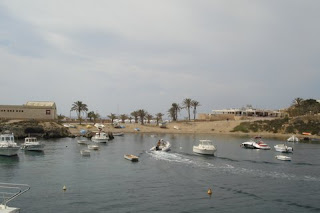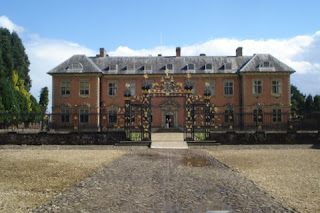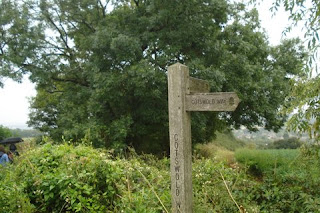
If anyone mentions ‘pirates’ to me it immediately piques my
interest. So when my friend Inkasuggested that I might like to visit the pirate
island of Tabarca off the Coasta Blanca in Spain, I was more than interested.
We caught a boat from Torrevieja for the short, pleasant
cruise to the island, just a few nautical miles off shore. The island was once
known as Illa de Sant Paul (Saint Paul’s Island) because it is believed that
St. Paul disembarked here. For many years up to the 18th century it
was a refuge for Barbary pirates and part of the Republic of Genoa. Later it
was fortified by Charles III of Spain. Around that time, some Genoese sailors
were shipwrecked off the coast of Tunisia and rescued by islanders from
Tabarca. They settled there and people of Genoese descent can still be found
on the island. From 1770 the island was known as Nueva Tabarca (New Tabarca).
My two travel writer friends, Inka and Darlene and I
wandered around the old town and explored the shoreline and ruins. The island
was once fortified with walls, bulwarks, warehouses, a governor’s house and barracks.
The gateways are still there as are the Governor’s House (now a hotel) and the church of St Peter and St Paul built in 1770. Later the garrison was removed and by the end of the 19th century the island was populated by about 1,000 people, mainly fishermen. Tabarca is the smallest inhabited islet in Spain. Today the population is around 50, although during the tourist season there are up to 4000 people a day who arrive as visitors.
The gateways are still there as are the Governor’s House (now a hotel) and the church of St Peter and St Paul built in 1770. Later the garrison was removed and by the end of the 19th century the island was populated by about 1,000 people, mainly fishermen. Tabarca is the smallest inhabited islet in Spain. Today the population is around 50, although during the tourist season there are up to 4000 people a day who arrive as visitors.
After seeing all the sights around the town, we stopped by a restaurant
for lunch, attracted by the ‘pirate’ who welcomed us inside.
We chose a table
on the terrace of the Nou Collonet, overlooking the sea and enjoyed a delicious
lunch from the menu of langostas y bogavantes, pescados and other traditional
Spanish cuisine. The island has several good restaurants as well as hotels for
overnight accommodations.
Inka meets the Pirate
Langostas
After lunch we hiked across the desolate grassy expanse to
the garrison ruins and the old lighthouse at the tip of the island. Tabarca is
a protected marine reserve for seabirds and various marine fauna. The sea
around the rocky shoreline is crystal clear and perfect for snorkeling. It was
declared a Marine Reserve in 1986, the first one in Spain. Boats to the island run
from Alicante, Torrevieja and Santa Pola. Some of them have glass bottoms so
you can view the reefs and sea life.
I didn’t see any pirates on Tabarca other than
the one who welcomed us to the restaurant, but it was certainly an excellent
way to spend the day with my friends.
Old Fortress
Lighthouse


































































